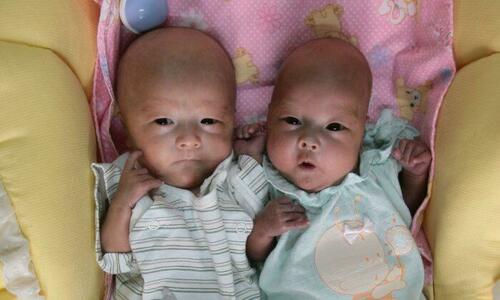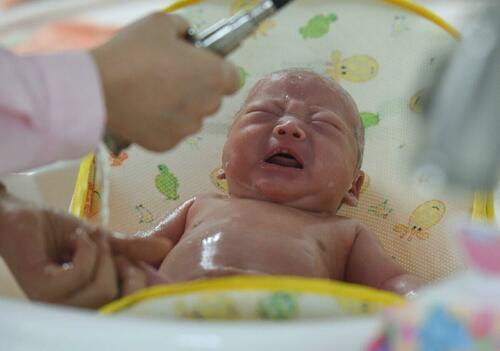
Authored by John Mac Ghlionn via The Epoch Times,
President Xi Jinping recently vowed to launch comprehensive initiatives to address China’s rapidly declining birth rate.
Behind the bombastic rhetoric, however, there lies a truly sobering fact: new policies probably won’t be enough to arrest China’s demographic decline. Here’s why.
In China, a hyper-traditional society, having a child out of wedlock is still frowned upon. Childbearing and childrearing are synonymous with marriage. Last year, the communist nation saw marriage rates hit a 35-year low. The sharp drop in marital vows comes at the same time China faces an impending demographic crisis. 2021 saw 7.6 million marriage registrations, the fewest since 1986. With falling birth rates and a rapidly aging population, China faces problems that are very much existential in nature.
In truth, China’s marriage crisis has been an issue for the best part of a decade. In the space of six years, between 2013 and 2019, the number of Chinese citizens getting married fell from 23.8 million to 13.9 million, a 41 percent drop. Of course, the Chinese Communist Party’s (CCP) ill-advised one-child policy, which was in place for 35 years (1980–2015), has resulted in far fewer people of marriageable age. The policy resulted in 400 million fewer babies being born.
Medical staff takes care of a newborn baby at a hospital in Fuyang in China’s eastern Anhui province, on Jan. 19, 2019. (STR/AFP via Getty Images)
China has also witnessed “changing attitudes to marriage, especially among young women who are becoming more educated and financially independent,” according to CNN. Due to “widespread workplace discrimination” and “patriarchal traditions,” an increasing number of women are saying no to marriage.
Some readers, I’m sure, will roll their eyes at the “patriarchal traditions” bit. If you happen to be one of them, I don’t blame you. I have been highly critical of the ways in which the “p word” has been weaponized and demonized by many individuals in the United States and beyond. However, patriarchal traditions look a little different in China than, say, the United States or the UK. The Chinese, we’re told, have a rather controversial saying: “If you don’t beat your wife every three days, she’ll start tearing up roof tiles.” A quarter of Chinese women are victims of domestic violence. Every 7.4 seconds a wife is beaten by her husband. As is clear to see, Chinese women can be forgiven for having second thoughts about marriage, especially if they were raised in an abusive household.
Besides the violence, there’s also another reason why fewer Chinese people are deciding to walk down the aisle. China is an incredibly expensive place to live. According to Mercer’s Cost of Living Index 2022, six of the biggest Chinese cities—Beijing, Shanghai, Shenzhen, Guangzhou, Qingdao, and Nanjing—are among the top 10 most expensive cities on the Asian continent. Meanwhile, Hong Kong, more or less controlled by Beijing, is the most expensive city in the world. Not surprisingly, more Hong Kongers are saying no to marriage and no to starting a family. If one is struggling to pay rent, having a child is probably the last thing on their mind.
So what, some will say, cities in the United States, UK, and Western Europe are also ridiculously expensive to live in. Yes, they are. But China’s GDP per capita is less than $10,000. This places the country between the Balkan nation of Montenegro and Botswana, located in southern Africa. The United States, on the other hand, has a GDP per capita of $69,000.
A man walks in front of a housing complex by Chinese property developer Evergrande in Beijing on Oct. 21, 2021. (Noel Celis/AFP via Getty Images)
For years, we have heard so much about China’s impressive GDP growth. At the same time, however, we have heard very little about its less-than-impressive GDP per capita.
What’s my point?
There are at least 90 million people currently working in Chinese factories. In a year, they can expect to earn roughly 55,000 RMB (less than $8,000). Even those working in more prestigious positions struggle to make more than $16,000 per year. By 2035, China’s GDP per capita is expected to be $28,700. Try getting married, paying rent, buying necessities, and starting a family on $28,700.
Moreover, it’s particularly difficult to start a family (or do anything of value) when you can’t find a job. Right now, China’s youth unemployment is close to 20 percent (8.1 percent in the United States (pdf)). Of course, China’s marriage problem isn’t exactly unique. Other countries around the world, including the United States, are also experiencing their own marriage-related issues. However, the size of the problem facing China and the CCP is, for lack of a better word, gigantic—especially now that its economy appears to be going down the proverbial lavatory.
Analysts at The Lowy institute, a Sydney-based think tank, insist that, even with “continued broad policy success,” China’s “annual economic growth will slow to about 3% by 2030 and 2% by 2040.” China’s economy, we’re told, appears to be suffering from a crisis in confidence among consumers. Is it any surprise? The average Chinese citizen, be they 25 or 75, is struggling to survive.
In an effort to address the marriage crisis, there’s always the chance that the CCP could use its cruel social credit system to punish adults who refuse to get married and start a family. The CCP might take inspiration from Russia, its close ally, where couples are currently being offered financial incentives to get married and have children. But, commonsense tells us that it will take a lot more than one-off payments and tax subsidies to solve China’s marriage situation, a problem that is fast becoming existential in nature. Money is a necessity, but it’s no substitute for genuine desire. Today, for reasons already explained, very few Chinese have any desire to get married. As the country becomes older and less efficient, expect the flame of desire to become even more faint.
...
Authored by John Mac Ghlionn via The Epoch Times,
President Xi Jinping recently vowed to launch comprehensive initiatives to address China’s rapidly declining birth rate.
Behind the bombastic rhetoric, however, there lies a truly sobering fact: new policies probably won’t be enough to arrest China’s demographic decline. Here’s why.
In China, a hyper-traditional society, having a child out of wedlock is still frowned upon. Childbearing and childrearing are synonymous with marriage. Last year, the communist nation saw marriage rates hit a 35-year low. The sharp drop in marital vows comes at the same time China faces an impending demographic crisis. 2021 saw 7.6 million marriage registrations, the fewest since 1986. With falling birth rates and a rapidly aging population, China faces problems that are very much existential in nature.
In truth, China’s marriage crisis has been an issue for the best part of a decade. In the space of six years, between 2013 and 2019, the number of Chinese citizens getting married fell from 23.8 million to 13.9 million, a 41 percent drop. Of course, the Chinese Communist Party’s (CCP) ill-advised one-child policy, which was in place for 35 years (1980–2015), has resulted in far fewer people of marriageable age. The policy resulted in 400 million fewer babies being born.
Medical staff takes care of a newborn baby at a hospital in Fuyang in China’s eastern Anhui province, on Jan. 19, 2019. (STR/AFP via Getty Images)
China has also witnessed “changing attitudes to marriage, especially among young women who are becoming more educated and financially independent,” according to CNN. Due to “widespread workplace discrimination” and “patriarchal traditions,” an increasing number of women are saying no to marriage.
Some readers, I’m sure, will roll their eyes at the “patriarchal traditions” bit. If you happen to be one of them, I don’t blame you. I have been highly critical of the ways in which the “p word” has been weaponized and demonized by many individuals in the United States and beyond. However, patriarchal traditions look a little different in China than, say, the United States or the UK. The Chinese, we’re told, have a rather controversial saying: “If you don’t beat your wife every three days, she’ll start tearing up roof tiles.” A quarter of Chinese women are victims of domestic violence. Every 7.4 seconds a wife is beaten by her husband. As is clear to see, Chinese women can be forgiven for having second thoughts about marriage, especially if they were raised in an abusive household.
Besides the violence, there’s also another reason why fewer Chinese people are deciding to walk down the aisle. China is an incredibly expensive place to live. According to Mercer’s Cost of Living Index 2022, six of the biggest Chinese cities—Beijing, Shanghai, Shenzhen, Guangzhou, Qingdao, and Nanjing—are among the top 10 most expensive cities on the Asian continent. Meanwhile, Hong Kong, more or less controlled by Beijing, is the most expensive city in the world. Not surprisingly, more Hong Kongers are saying no to marriage and no to starting a family. If one is struggling to pay rent, having a child is probably the last thing on their mind.
So what, some will say, cities in the United States, UK, and Western Europe are also ridiculously expensive to live in. Yes, they are. But China’s GDP per capita is less than $10,000. This places the country between the Balkan nation of Montenegro and Botswana, located in southern Africa. The United States, on the other hand, has a GDP per capita of $69,000.
A man walks in front of a housing complex by Chinese property developer Evergrande in Beijing on Oct. 21, 2021. (Noel Celis/AFP via Getty Images)
For years, we have heard so much about China’s impressive GDP growth. At the same time, however, we have heard very little about its less-than-impressive GDP per capita.
What’s my point?
There are at least 90 million people currently working in Chinese factories. In a year, they can expect to earn roughly 55,000 RMB (less than $8,000). Even those working in more prestigious positions struggle to make more than $16,000 per year. By 2035, China’s GDP per capita is expected to be $28,700. Try getting married, paying rent, buying necessities, and starting a family on $28,700.
Moreover, it’s particularly difficult to start a family (or do anything of value) when you can’t find a job. Right now, China’s youth unemployment is close to 20 percent (8.1 percent in the United States (pdf)). Of course, China’s marriage problem isn’t exactly unique. Other countries around the world, including the United States, are also experiencing their own marriage-related issues. However, the size of the problem facing China and the CCP is, for lack of a better word, gigantic—especially now that its economy appears to be going down the proverbial lavatory.
Analysts at The Lowy institute, a Sydney-based think tank, insist that, even with “continued broad policy success,” China’s “annual economic growth will slow to about 3% by 2030 and 2% by 2040.” China’s economy, we’re told, appears to be suffering from a crisis in confidence among consumers. Is it any surprise? The average Chinese citizen, be they 25 or 75, is struggling to survive.
In an effort to address the marriage crisis, there’s always the chance that the CCP could use its cruel social credit system to punish adults who refuse to get married and start a family. The CCP might take inspiration from Russia, its close ally, where couples are currently being offered financial incentives to get married and have children. But, commonsense tells us that it will take a lot more than one-off payments and tax subsidies to solve China’s marriage situation, a problem that is fast becoming existential in nature. Money is a necessity, but it’s no substitute for genuine desire. Today, for reasons already explained, very few Chinese have any desire to get married. As the country becomes older and less efficient, expect the flame of desire to become even more faint.
…








